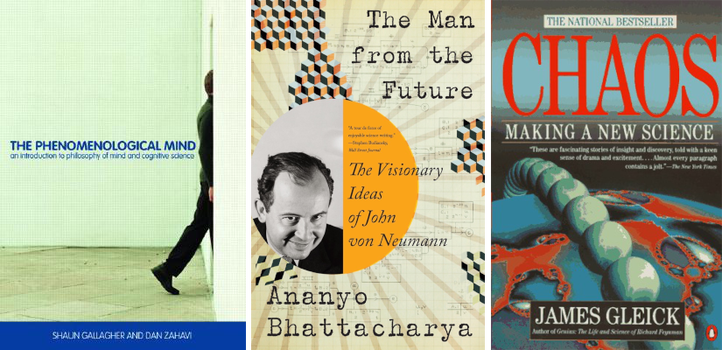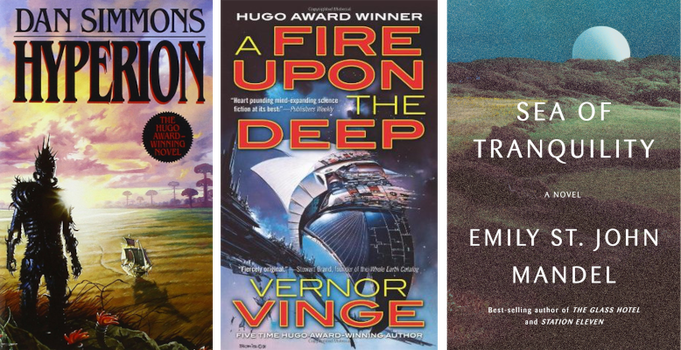Previous book lists: 2021, 2020, 2019, 2018. My Reading List has a full log of the books I read.
Another year, another slate of books to reflect back over! I read about as many books this year as I usually do (perhaps slightly fewer), but many more of them were read as audiobooks than I usually do.
Non-fiction

For this year’s crop of non-fiction books, it was challenging to pick a top 3. Each of these books strongly influenced my thinking during the year, so they’re effectively equal-weighted in terms of ranking.
- The Phenomenological Mind (Shaun Gallagher, Dan Zahavi)
TPM is a philosophy textbook about phenomenology, but it’s written in a pretty accessible style if you’re modestly familiar with philosophy. It was likely the most illuminating books I read this year, as it gave me a much more complete set of words/concepts to talk about consciousness. If you talk to people about philosophy enough, or are in circles that discuss AI, you often get to this frustrating breaking point in conversations around debates about what consciousness is. Phenomenology, in a sense, is a study of that debate.
I haven’t had time to digest the concepts in this book enough to give a full treatment to them, but a couple key items I enjoyed reading in this book were: (1) the idea of reflective and pre-reflective consciousness, (2) the idea that consciousness and embodiment are intertwined at a deep level, (3) a description of how conscious thought interacts with the passage of time, (4) the integration of perception and intentionality into consciousness, and (5) the idea that there is valuable scientific information to be discovered from using an “inside-out” view of consciousness as the object of study.
On the methodology of phenomenology:
Phenomenology has as its goal, not a description of idiosyncratic experience – ‘here and now, this is just what I experience’ – rather, it attempts to capture the invariant structures of experience. In this sense, it is more like science than like psychotherapy. Psychotherapy is focused on the subject as a particular person and may appeal to introspection in its concern about the way and the why of the person’s experience of the world, here and now. By contrast, phenomenology is not interested in understanding the world according to Gallagher, or the world according to Zahavi, or the world according to you; it’s interested in understanding how it is possible for anyone to experience a world. In this sense, phenomenology is not interested in qualia in the sense of purely individual data that are incorrigible, ineffable, and incomparable. Phenomenology is not interested in psychological processes (in contrast to behavioural processes or physical processes). Phenomenology is interested in the very possibility and structure of phenomenality; it seeks to explore its essential structures and conditions of possibility. Phenomenology aims to disclose structures that are intersubjectively accessible, and its analyses are consequently open for corrections and control by any (phenomenologically tuned) subject. (26)
Strong recommend if any of the above sound interesting.
- The Man from the Future (Ananyo Bhattacharya)
A supremely entertaining book about the life of John von Neumann. I knew of von Neumann (it’s hard not to, after taking a Computer Science degree), and knew he was a once-in-a-generation genius, but actually reading about his accomplishments was still staggering. The man made substantive contributions to quantum mechanics, effectively invented the field of game theory, designed reprogrammable computers, worked on self-replicating machines (cellular automata), and the list goes on. His Wikipedia page is… a sight to behold.
What I liked about this book is that, while it was a biography and not a technical book, it had a fairly satisfying balance between information about von Neumann’s life (and peculiarities) and the technical background for the contributions he made. This book also traces a very satisfying curve through the history of early 20th century math/physics – including bits about Gödel’s incompleteness theorem, the development of quantum mechanics, the Manhattan project, early predictions of a technological singularity, and tons more.
On von Neumann nearly scooping Gödel’s second incompleteness proof:
Von Neumann kept thinking about Gödel’s proof after the Königsberg conference. On 20 November, he wrote excitedly to Gödel. ‘Using the methods you employed so successfully … I achieved a result that seems to me to be remarkable, namely,’ von Neumann continued with a flourish, ‘I was able to show that the consistency of mathematics is unprovable.’ Von Neumann promised to send him his proof, which he said would soon be ready for publication. But it was too late. Gödel, probably sensing that von Neumann was hot on his heels after their conversation in Königsberg, had already sent his paper to a journal. He now sent a copy to von Neumann. Crestfallen, von Neumann wrote back, thanking him. ‘As you have established the theorem on the unprovability of consistency as a natural continuation and deepening of your earlier results,’ he added, ‘I clearly won’t publish on this subject.’ So saying, von Neumann quietly passed up the opportunity to stake a claim on the most remarkable result in mathematical history.
On von Neumann’s temperament affecting the development of classic game theory:
Von Neumann’s biggest blind spot proved to be his failure to consider games in which coalitions were either forbidden or players could not, or simply did not want to, team up. As game theory gained a reputation for a relentless focus on cut-throat competition between calculating individuals, its progenitor did too. Yet the idea that anyone would choose to go it alone when cooperation produced better results was foreign to von Neumann’s central-European temperament. He did not think that was the way the world worked. ‘To von Neumann,’ says Leonard, ‘the formation of alliances and coalitions was sine qua non in any theory of social organisation.’
Strong recommendation for math/physics history enthusiasts. Would also recommend reading this review of this book on ACX.
- Chaos: Making a New Science (James Gleick)
I read Chaos ~directly after The Man from the Future, and they pair quite well together. TMftF naturally concludes in the late 1950’s, with von Neumann’s death – quantum phenomena had been quantified, computing had been invented, and mathematics had been proven to be incomplete. Chaos picks up where that left off, with scientists and physicists puzzling about what to do with the shattered pieces of the scientific optimism of the early 1900s.
I vaguely knew about chaos theory before reading this book, but only at a Jurassic Park level. Chaos doesn’t get too deep into the actual mathematics of the theory (although, there is a bit), but – like the other 2 books I listed above – gives enough background to start building an intuition for the subject matter.
The biggest takeaway I had from Chaos was that, even in a deterministic universe, there are phenomena that are computationally predictable. The classic example is weather systems – even with perfect modeling, minuscule measurement errors compound quickly to make long-term forecasting impossible. But, a personally more interesting example is that of free will – chaos theory makes free will (or, really, the illusion of free will) compatible with a deterministic universe. Even if we could create a perfect simulation of a brain, it would still functionally be unpredictable – sustaining the illusion of free will contra the “clockwork universe” alternative.
On free will:
[Doyne] Farmer said, “On a philosophical level, [phenomenon of chaos] struck me as an operational way to define free will, in a way that allowed you to reconcile free will with determinism. The system is deterministic, but you can’t say what it’s going to do next. At the same time, I’d always felt that the important problems out there in the world had to do with the creation of organization, in life or intelligence. But how did you study that? What biologists were doing seemed so applied and specific; chemists certainly weren’t doing it; mathematicians weren’t doing it at all, and it was something that physicists just didn’t do. I always felt that the spontaneous emergence of self-organization ought to be part of physics.
On the rediscovery of self-similarity at a cultural level:
Paradoxically, perhaps, the appreciation of scaling phenomena must have come from the same kind of expansion of human vision that had killed the earlier naïve ideas of self-similarity. By the late twentieth century, in ways never before conceivable, images of the incomprehensibly small and the unimaginably large became part of everyone’s experience. The culture saw photographs of galaxies and of atoms. No one had to imagine, with Leibniz, what the universe might be like on microscopic or telescopic scales—microscopes and telescopes made those images part of everyday experience. Given the eagerness of the mind to find analogies in experience, new kinds of comparison between large and small were inevitable—and some of them were productive.
Chaos discusses fractals, geometry, self-similarity, and a philosophy of the study of physics/mathematics – particularly, the breakdown of reductionism with the discovery of self-similar and scaling phenomena. I also particularly liked the phrase “sensitive dependence on initial conditions”, which is the more technical name for the colloquial “butterfly effect”
This book sent me down many rabbit holes – on strange attractors, Feigenbaum’s constants on the universality of self-similarities, the snowball earth theory, B A Huberman’s discovery of chaos in the eye movement of patients with schizophrenia, and many more.
Another strong recommendation for math/physics history enthusiasts.
Fiction

- Hyperion (Dan Simmons)
The Canterbury Tales, but in space. Hyperion is a collection of short stories tied together by an overarching frame narrative. Each story is a pastiche of a classic scifi/literature subgenre (cyberpunk, noire, Heart of Darkness-esque, etc.), which made this an interesting varied read. It’s also a good monster tale. Unfortunately, (mild spoiler), the ending isn’t really satisfying and requires you to read on to the second book.
- A Fire Upon the Deep (Vernor Vinge)
I finally got around to reading AFUtD after it being on my to-read list for years. It was worth the wait. It’s an excellent grand space opera, with tons of interesting world building, alien races, foreign physics, interstellar travel, and all the other attendant scifi tropes. It also features some quite evocative ideas about how AIs (“transcendent powers”) would interact with biological creatures.
Later in the year, I read A Deepness in the Sky – the second book set in AFUtD’s universe. Deepness was worth reading too, but didn’t quite capture the grandiosity of AFUtD.
- Sea of Tranquility (Emily St. John Mandel)
Another great Emily St. John Mandel novel. At this point, I’ll blind buy anything that she writes. Tranquility retains Mandel’s characteristically ethereal style, but has more of a speculative fiction / scifi bend than her earlier work. This is definitely a “post-pandemic” novel, and includes some interesting autobiographical components of Mandel’s experience of writing a wildly popular pandemic novel (Station Eleven).
Tranquility isn’t as easily recommendable as Station Eleven or The Glass Hotel, but it was an enjoyable read that I’d suggest to people who enjoyed her previous novels.
Honorable Mentions
-
Thinking in Bets (Annie Duke) - I’ve recommended this book in several other posts. It didn’t make my “top” list for this year only because I’d already internalized most of the ideas present in this book before reading it, so much of the content didn’t feel new to me. However, it’s a great introduction to probabilistic thinking and reasoning under uncertainty, so 👍👍 from me.
-
Klara and the Sun (Kazuo Ishiguro) - A short, sentimental book about a robot and her human friend. This book just barely made the list, since while I enjoyed the writing, the plot wasn’t all that memorable. Klara featured some good world building though, and it was an enjoyable read. Halfhearted recommendation.
-
The Evolving Self (Robert Kegan) - A great book on adult psychological development stages, but I’d recommend skipping reading the original source, and instead read David Chapman’s fantastic summary: “Developing ethical, social, and cognitive competence”
Happy reading!
Cover: Gold Creek Pond